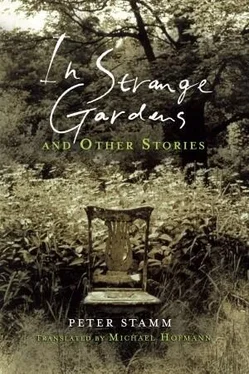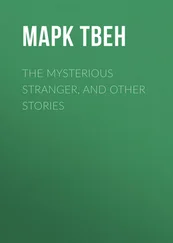“Dogs need more than half their brain capacity, just for smelling,” I said.
“Everything’s so complicated,” said Anita. “Things used to be simpler.”
Maria said she was going down to the beach. The rest of us went on with the conversation for a while, and then we set off after her. It took us a long time to find her, sitting in the dark, looking out to sea. The crashing of the waves seemed to be louder now than in the daytime. Maria said: “When you get along with each other, you’re even worse than when you’re quarreling.”
Sometimes, Maria would cook Italian recipes for us. Then she would do the shopping herself and spend hours in the kitchen, and not let anyone in. She would have liked to be a good cook, but she wasn’t.
Maria suffered least from the heat, and I noticed her getting more impatient with the rest of us by the day. One evening she said she had rented a car for the next day, she wanted to go on a trip. We could come along if we wanted. Anita and Stefan were delighted, but I didn’t feel like driving anywhere, and I said so. Maria didn’t say much, beyond that she couldn’t force me to come. I had drunk too much wine as I did every evening, and I said I was going to sleep. As I lay in bed, I could hear the others discussing their outing, what they wanted to see, where they thought they might go.
“We should set out early,” Maria said, “so that we arrive before it gets really hot.”
“I’ll take the camera,” said Stefan, and Anita said she wanted to buy herself a hat, a straw hat.
I thought I’d like to stay like that forever with the open window, listening to the others making plans. Then they blew out the candles and brought in the dirty dishes, quietly, so as not to disturb me. When Maria crept under the covers next to me, I pretended to be asleep already.
That was the evening I felt such sympathy for Maria, when I felt so sorry for her and for myself, and for the whole world. As I lay in bed now, unable to sleep, hearing Maria’s breathing next to me, I again had the feeling of absolute meaninglessness, which was at once sad and liberating. I thought I would never feel anything other than this sympathy, this feeling of connection with everything.
The others were already gone by the time I woke up. The whole house smelled fresh of soap and deodorant. I put on some coffee. I had finished my cigarettes the night before, and I had resolved to give up smoking now. Then I saw Stefan’s cigarettes lying out on the table, and I helped myself. I drank my coffee, and I walked through the woods into town to buy more cigarettes. It wasn’t even nine o’clock, but it was already heating up, and there were people everywhere making their way to the beach.
When I got back the house seemed deserted, as though no one had lived in it for ages. From the garden next door, I heard children playing, and in the distance there were cars and motorbikes going by. The garden chairs were standing under the pines, where we’d left them yesterday in our quest for shade. They had our magazines on them, and open books, lying face down. In the top of a tree, a bird screamed very loudly and very briefly. The children were quiet now, or they had gone inside, or around to the front. I felt empty but I didn’t feel like eating, and just smoked another cigarette.
In the time we’d been here, I’d gotten much less reading done than I’d thought I would. Now that I finally had time I yearned for life, but I was still happy not to be sitting in a stuffy car, or traipsing through a sleepy town, through pedestrian precincts full of sweaty tourists, or drinking coffee on a crowded café terrace. I felt lonely, the way you only feel lonely in summer, or when you’re a kid. I felt all alone in a world that was full of groups and families and couples, who were all together somewhere, far away. I read, but before long I put my book down. I leafed through some of the magazines, then I made some more coffee, and smoked. It was noon by now, and I went inside to shave for the first time in many days.
I had started to worry about the others when they finally came back in the evening. They seemed to be feeling guilty for having had such a lovely day. They had already returned the car.
They walked through the garden into the house, laden with plastic bags and packages. Anita was wearing a straw hat, and Stefan had a kite. Maria gave me a kiss on the mouth. She was hot from the long drive, and she smelled of sweat.
We went down to the sea, where there was hardly anyone left now. The sun was just over the horizon. The others ran out into the shallow water. I sat on the sand and smoked, and watched them splashing each other. Anita still had her new hat on.
After a while, they came out of the water. Maria stopped just in front of me, and dried herself. Against the light, I could only see her outline. Then she tossed the damp towel at me and said: “Well, and did you have a nice day, you stick-in-the-mud?”
Only now did they begin to talk about their trip. Briefly, I regretted not having gone with them, not because it had been anything special but because it would have been nice to share the memory with them. I said I had spent the day reading, and maybe they felt a little envious of me. Anita said they had brought me something, a present. Stefan ran along the beach with his kite but there was no wind, and in the end he gave up. We stayed by the sea till the sun had gone down, and then we went into the house to eat.
All through supper, Maria kept making little digs at my sluggishness till I lost my temper and told her to stop it. Surely she could get through one day without me. But she said I was always boring like that, even at home. I got up and went out into the garden. I heard the others finish their meal in silence. Then Maria came out. She stood in the doorway and looked out at the trees. After a while she said: “Don’t be so childish.”
I said I wasn’t hungry anymore, and she said she wanted to go for a walk with me, down on the beach.
It wasn’t quite dark. We walked along the beach close to the water, where the sand was firm and it was easier to walk. For a long time we didn’t speak. Then Maria said: “I’ve been looking forward all day to seeing you again.”
“You should have said something yesterday,” I said. “I had too much to drink, and I didn’t feel like going anywhere. I don’t like the heat.”
“We’re too different,” said Maria. “I don’t know. Maybe …”
“Surely we can manage to be apart for one day.”
“It’s not that,” she said, and then, more in surprise than anger, she asked: “What do you want anyway …?”
She stopped but I walked on, faster than before. She came after me.
“You always dramatize everything,” I said. “I don’t want anything.”
“I’m not dramatizing anything,” said Maria. “We just don’t get along.”
“What do you mean by that?”
“It’s not your fault.”
Maria stopped again, and this time I didn’t walk on. I turned to face her. There was a jellyfish on the sand in front of her, a small, transparent mound of aspic. She nudged it with her foot.
“Silly things,” she said. “They’re beautiful when they’re in the water. But when they get washed up onto the shore … there’s nothing you can do for them.”
She picked up a handful of sand and crumbled it onto the jellyfish. She waited.
Finally I said: “Do you want to …?”
“When the sun shines, there won’t be anything left of it,” said Maria. She hesitated, and then she said yes.
“It’s Italy,” I said. “It’s only because we’re in Italy. Back home, everything will feel completely different.”
“Yes,” said Maria, “that’s why.”
She said she didn’t feel good here. “It’s not the heat. But I don’t have any feeling of having come from here. It doesn’t say anything to me. I can’t imagine my grandfather living here. I can’t even imagine my father coming here for vacation. I thought there’d be something here for me. But it’s all completely foreign. And you … I have to feel I belong somewhere, with someone.”
Читать дальше












